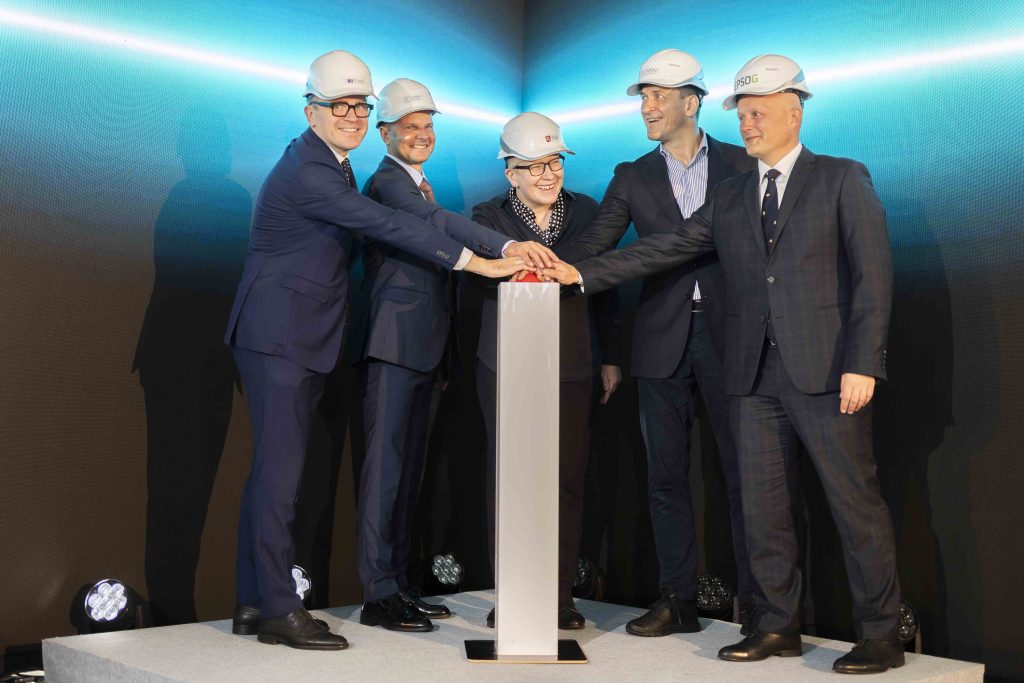
“Energy Cells” energy storage system goes live - provides isolated operation reserve service at full power of 200 M
2023-10-18

“Energy Cells” provides the isolated operation reserve service, which is essential for the security of the Lithuanian energy system, at a full power of 200 MW. The official launch of the system was announced today in Vilnius Battery Park by the Prime Minister Ingrida Šimonytė, the Minister of Energy Dainius Kreivys, the Head of the European Commission’s Representation in Lithuania Marius Vaščega, the Head of EPSO-G Mindaugas Keizeris, and the Head of the energy storage system operator “Energy cells” Rimvydas Štilinis.
“In recent years, we have had several opportunities to see how dangerous a weapon energy war can be, and we can only be glad that Lithuania has not fallen under the illusion that autocratic regimes separate the spheres of politics and economy. We are one of the first countries to move away from Russian energy sources, and a successful isolated operation test of Lithuania’s electricity system performed in the spring showed that our own system is essentially ready for desynchronisation from the Russian energy system. This battery park is an essential element of the overall system. I am delighted with the result and thank all those who contributed to the planning and implementation of the project. I have no doubt that we are moving in the right direction”, said Prime Minister Ingrida Šimonytė.
“Engineers at the ‘Energy Cells’ Storage System Control Centre are on duty 24 hours a day, 7 days a week, ensuring the uninterrupted provision of the instantaneous electricity reserve service. In the event of a disturbance, the system will react automatically within 1 second, giving or taking power from the transmission grid when needed, charging or discharging the storage units and helping to maintain a stable system frequency. The service can be provided by the system’s four battery parks continuously for about one hour, or until other sources of power generation also capable of providing the service, such as the Kruonis PSPP, turn on.
“The attacks on European energy infrastructure projects in recent years show that the threats are real and that assuring energy security is of utmost importance. Until synchronisation, the system will ensure uninterrupted electricity supply in the event of any disturbances”, said Minister of Energy Dainius Kreivys. According to him, batteries are one of the key components of our energy security, marking a new qualitative level of grid resilience, and will help Lithuania to meet one of the most important pre-synchronisation challenges – the ability to operate in isolated mode, i.e. independently.
“Energy Cells” has been granted up to €87.6 million under the “NextGeneration Lithuania” plan of the EU’s Recovery and Resilience Facility (RRF) measure “NextGenerationEU” to build a system of four battery parks.
“The synchronisation of the Baltic electricity grids with those of continental Europe is one of the key political priorities for the creation of the EU Energy Union. It has been a priority EU energy
infrastructure project for the European Commission for many years, which received a significant EU funding. The ‘Energy cells’ storage unit project is an example of European solidarity. Funded by the EU’s newest instrument, the European Union’s Recovery and Resilience Facility, it will allow the three Baltic countries to complete their energy integration into the EU in a secure way. The battery parks will then contribute to the European Green Deal goals and to the development of secure, affordable and sustainable energy in the Eastern Baltic Sea Region and the EU as a whole” said Marius Vaščega, Head of the European Commission’s Representation in Lithuania, in his speech.
“We have one of the most flexible and fastest frequency management tools in the energy industry – an energy storage system integrated into the transmission grid. If the need arises to operate in isolated or islanded mode, we could maintain the frequency independently. The project took 34 months to complete from the date of the international call for tenders. This is a record timetable, given that this type of project is the first of its kind in the Baltic States, one of the first and largest in Europe, and will certainly be among the leaders in the field of storage systems for at least a few more years. I thank the ‘Energy cells’ team and the contractors who have worked very hard to strengthen the security of the country’s energy system”, said Rimvydas Štilinis, CEO of “Energy Cells”.
The main contractors for the “Energy Cells” storage system are a consortium of “Siemens Energy” and “Fluence”. The companies implementing the project on a joint basis have won an international tender launched in January 2021 for the procurement of system installation services and energy storage technologies. Under a €109 million contract signed between “Energy cells” and the consortium, consortium will also provide after-sales service and maintenance for another 15 years.
The 200 MW and 200 MWh storage system, once synchronised with the continental European electricity grid, will contribute to Lithuania’s ambitious goals of developing renewable energy sources. The battery parks will then be able to store electricity from solar and wind generation above consumption and, if needed and if consumption increases, feed the electricity stored from renewable generation sources into the grid.
“Energy Cells”, which has been appointed as the operator of the energy storage system, is 100% owned by the EPSO-G group of energy transmission and exchange companies. The rights and obligations of the sole shareholder of EPSO-G holding are implemented by the Ministry of Energy of the Republic of Lithuania.